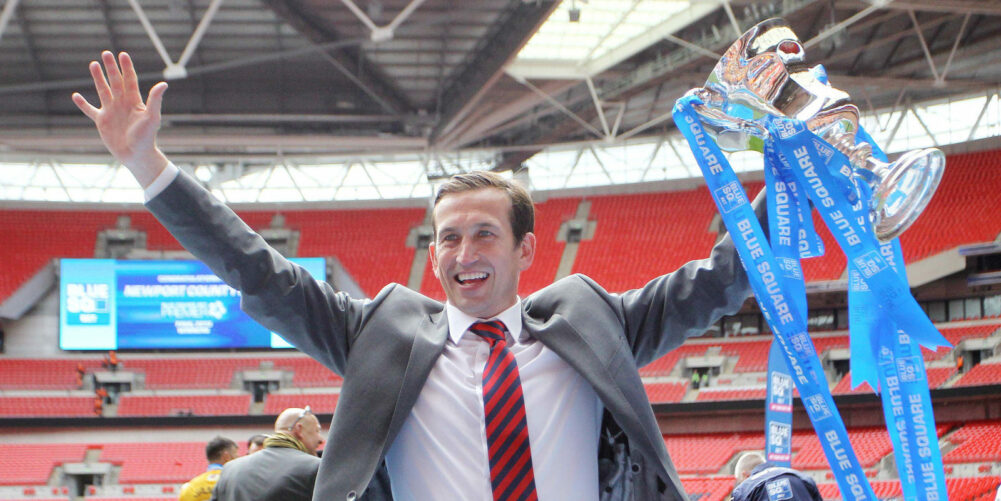Jimmy Dack will never forget the day Newport County ended their 25-year exile from the Football League.
Tipped for relegation. Constructed from waifs and strays. When the 2012-13 campaign kicked off, not even the most optimistic supporter dreamed the season would end in a shower of ticker tape at Wembley.
Yet that’s exactly what happened as a side built by the late Justin Edinburgh notched two last-gasp goals to clinch play-off victory over Wrexham.
“It was one of the best days I’ve ever had in life,” says Dack, assistant to Edinburgh in Newport’s glorious first season back at Rodney Parade.
“My children being born. Getting married to my wife. Then that day at Wembley. It was just an unbelievable experience.
“Seeing grown men and women and children crying because their football club had got back into the Football League. To stand there on the pitch and see what it means. It was brilliant, absolutely fabulous.”
In the weeks since Edinburgh’s death at the age of 49, tributes have flowed from all corners of the game. Few, though, have more reason to celebrate his life than the supporters of Newport County.
When Edinburgh arrived in South Wales in the Autumn of 2011, the Exiles were going nowhere but down. Second bottom, one win in 14 games. Hard up and soft centred.
“There was so much negativity,” recalls Dack. “But we could see the potential. The club was huge and the fanbase was magnificent. It was just a case of pulling it together.”
And that’s what Edinburgh did, through a mixture of fan engagement, exceptional man-management and clever recruitment honed by over a decade in the Non-League game.
Andy Sandell, one of his first acquisitions, was playing part-time football at Chippenham and, at 29, had all but abandoned thoughts of returning to the professional ranks.
“I’d fallen out of love with the game completely,” recalls the ex-Bristol Rovers wideman, who would play 41 games at wing-back in the promotion season.
“I got paid up by Wycombe, then went to play at Chippenham with my friends. I just wanted to enjoy football again.
“It was then that Justin knocked on the door and said ‘Come and play a couple of games for me, see how it goes’.
“I knew Jimmy and a few of the lads, so I thought ‘Why not?’ They turned out to be some of the best years of my life.”
Sandell was typical of Edinburgh’s offbeat recruitment strategy. Having survived relegation and reached the FA Trophy final, Newport were taken over by Les Scadding, an unemployed mechanic who’d won a £45m Euromillions jackpot.
Yet in the summer of 2012, the former Spurs defender largely stuck to his principle of hauling unwanted players off the scrapheap.
Aaron O’Connor, Edinburgh’s skipper at Rushden, had been dumped by Luton after a season of toil at Kenilworth Road. The 28-year-old was reinvigorated, netting 20 times.
Lenny Pidgeley was released by Exeter, Jake Thomson by Forest Green. Tony James, unwanted at Burton after five years’ sterling service, was pushing 34 but turned in a succession of stellar performances at centre-half.
“Tony was immense,” says Dack. “So was David Pipe. And don’t forget Mike Flynn. We got him on a free from Bradford and he was so professional around the place, a fantastic example.”
Edinburgh even wrung a few decent performances from Jefferson Louis, the journeyman striker currently playing for his 37th different club.
“Justin never signed the easiest players to manage in terms of reputation and attitude,” says Sandell. “But he got those players to perform, which says a hell of a lot about him.
“He was a friend, not a manager. If you had personal problems or financial difficulties or anything like that, you could go and talk to him. If he could, he’d try to find a solution.”
Those sentiments are echoed by Christian Jolley, arguably Edinburgh’s shrewdest signing of the season.
Promoted with AFC Wimbledon in 2011, the forward found himself surplus to requirements when Neil Ardley replaced Terry Brown midway through the Dons’ second season in League Two.
Jolley pitched up in South Wales low on confidence, yet by the end of the campaign had scored 15 goals in 26 games, including the crucial opener against Wrexham.
“You don’t realise how much somebody impacts your life until something tragic like this happens,” says the 31-year-old, now at Woking.
“But I played the best football of my career at Newport under Justin. He was responsible for that and I’ll be forever grateful. He was a supreme motivator, a very talented guy. Whether it was a rocket, a scream, a shoulder to cry on – he just knew what you needed.
“I remember scoring six goals in my first month at the club. He pulled me aside in the sixth game and said something like, ‘You’ve done really well but you’re not going to get 20 at this rate’.
“It was a little bit of banter, but it planted the seed that I could do more. A couple of months later, it was ‘Any danger of helping your mates out?’
“I walked away thinking ‘I’m scoring every week, is he taking the Mick?’ But before you know what’s happened, I’ve got double figures for assists.
“He had this ability to squeeze everyone for everything they were worth. He empowered you, but he did it differently with every player.
“And the great thing was, it was always good natured. If he hammered you and you gave a bit of banter back, you knew it would be taken in the right spirit.
“Mind you, he always had the last laugh. If you had a comeback for round one, he’d put you down in round two! He was just an amazing character, a proper bloke. It’s a tragedy he’s gone.”
Anchored by the experience of men like James and Flynn, and gelled by the fun-filled ethos their manager instilled, Newport roared to the top of the table and hovered around the summit until Christmas.
“We didn’t expect it,” admits Dack. “Then all of a sudden, you’re thinking ‘Actually, we’re rolling over pretty much everybody. We can do this!’”
Sandell adds: “There were a couple of games that made you think ‘Yeah, this is on’. We beat Hereford 2-0 at home in front of 5,000 people. Then we smashed Luton at home. They were supposed to be out-and-out favourites, paying big money, this that and the other. We put five past them and just went on a roll from there.
“Towards the end we had something stupid like four or five games in ten days. The lads were knackered.”
In the end, the relentless consistency of Mansfield proved too much for Newport, who were punished for a dodgy January and eventually finished in third, ten points off the pace.
By then, however, the Exiles were on a run of one defeat in ten and roared into their two-legged play-off semi-final with Grimsby in buoyant mood.
The Mariners were dispatched 2-0 on aggregate, setting up an all-Welsh final against highly-fancied Wrexham.
“We were the smaller club at the time,” says Dack. “Nobody thought we were going to win. But I just sensed it.
“We’d lost the Trophy final the season before and it was almost like we were there to take pictures. It was ‘Wow, what are we doing here?’ The play-off final was completely different. We turned up ready to do a job, and that’s what we did.”
Like many high-stakes contests, the game was dire.
“Even on the pitch, I remember thinking ‘God, if anyone’s watching this they must be bored to tears,” laughs Sandell.
It was also dominated by Wrexham, who missed a slew of first-half chances.
“They battered us,” admits Jolley. “We had to weather 85 minutes of pressure and Lenny Pidgeley, our keeper, was outstanding.”
Then, with six minutes remaining, Wrexham defender David Artell inadvertently ficked a long ball into Jolley’s path. The striker, bang in form, was never going to miss.
“I used every ounce of energy celebrating.” he recalls. “I was jubilant, but dying. Then you look at the clock and it just seems to stand still.
“Your mind plays all sorts of tricks at that point. You’re thinking ‘This is daylight robbery. Do we deserve it? If they score now, it would only be fair’. It’s hard to concentrate. But then Aaron O’Connor, left, scored in the 94th minute and it was party time.”
For Newport, run down, relegated and eventually dissolved in 1989, it was a return to the big time that many feared would never come. The exile was over.
“When I first turned up, I wasn’t aware of what had happened to the club,” says Jolley. “But you talk to fans and people around the club and you immerse yourself in the history.
“So come the final, you understand why 16,000 people travelled from Wales and spent an absolute fortune. They wanted to witness history.”
And for those involved, those days remain a testament to what camaraderie, spirit and togetherness can achieve.
“That’s what did it,” says Sandell. “I remember after the final, all the lads went to Albufeira in Portugal for about three or four days. The chairman paid for our flights and rooms.
“A couple of days after we arrived, the Kidderminster boys turned up in the same hotel. Us lot were all sitting around the same long table – laughing, joking, playing games.
“The Kiddy lads were all off in little groups of twos and threes. I think that said everything about why we’d gone up. You could see the difference a mile off. It was a hell of a team.”
By Chris Dunlavy






















